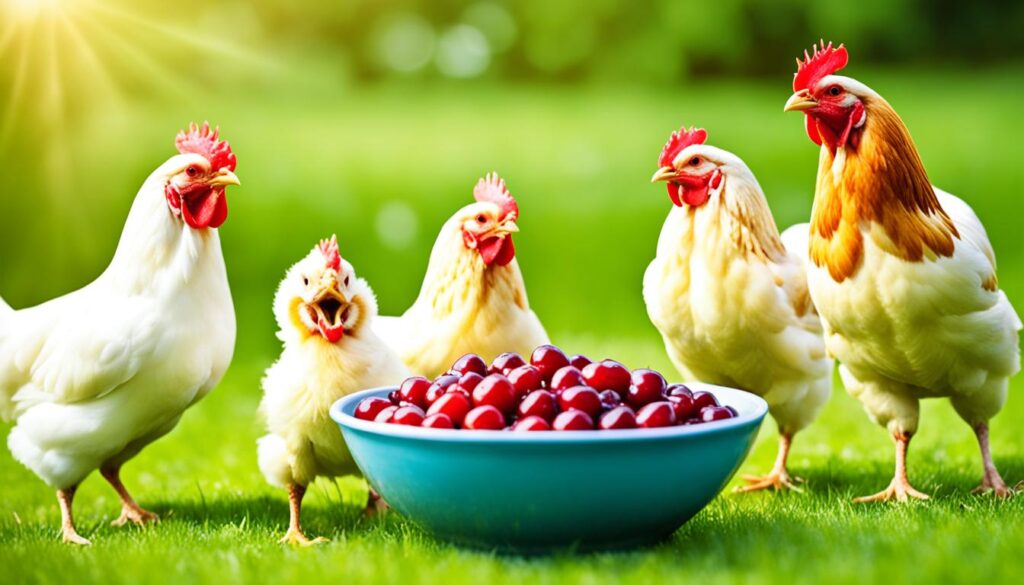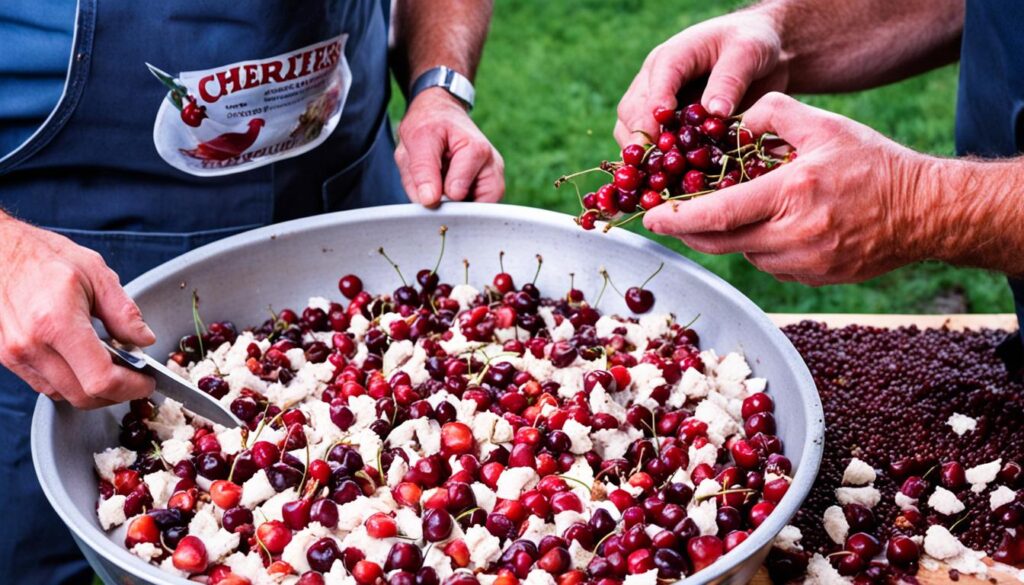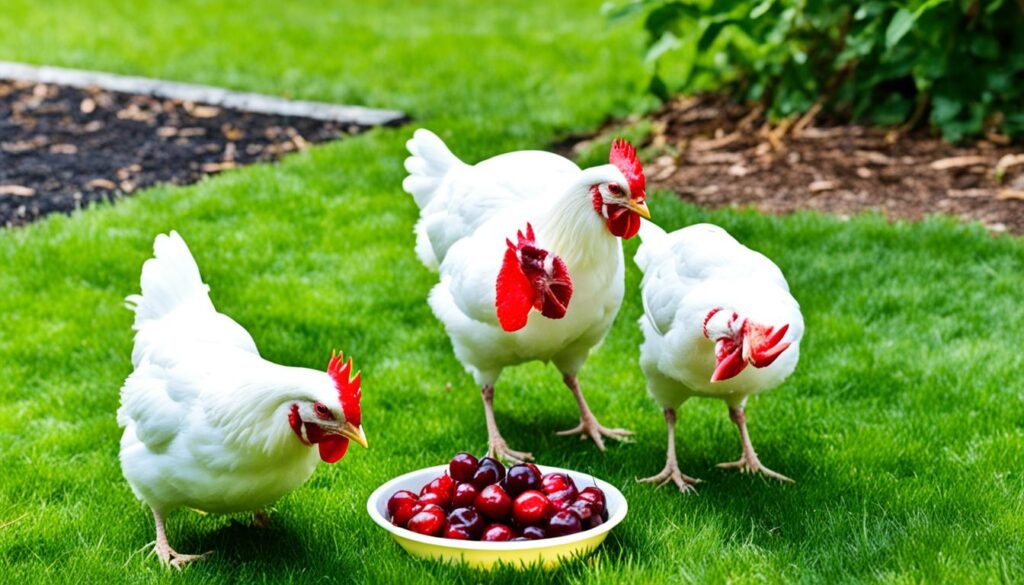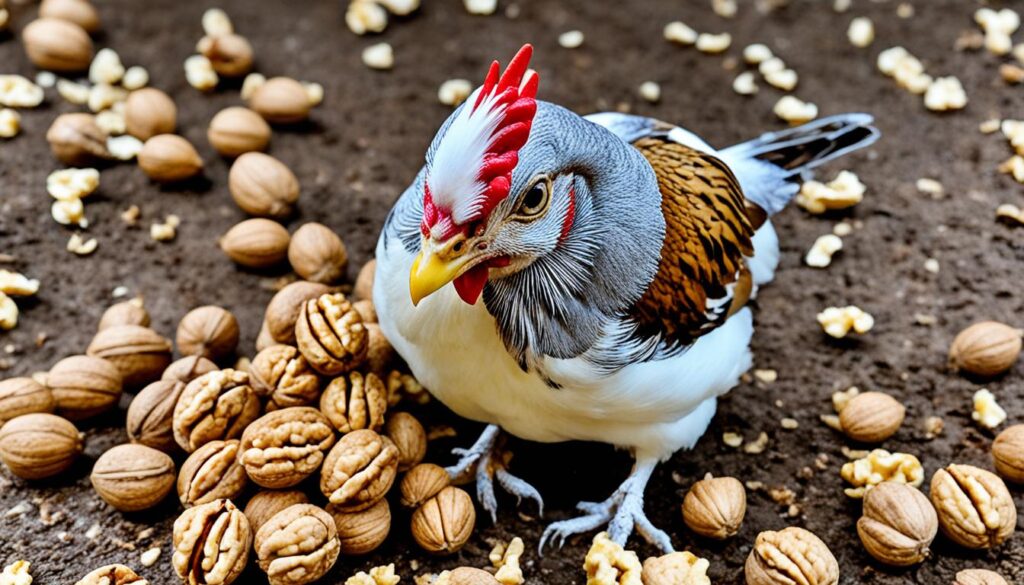Did you know chickens can recognize up to 150 faces? These birds have great social skills and see better than humans in daylight. If you have backyard chickens, you might wonder what foods they can eat, like cherries.
Chickens can eat cherries, but be careful when giving them to your flock. The fleshy part of the cherry is okay, but remove the pits, stems, and leaves first. This prevents health problems.
Key Takeaways:
- Chickens can eat cherries, but the pits, stems, and leaves should be removed first.
- Cherry pits contain trace amounts of cyanide, which can be toxic to chickens if consumed in large quantities.
- Portion control is important when feeding cherries to your backyard flock, as too many can cause digestive issues.
- Introduce cherries gradually and monitor your chickens for any signs of discomfort or illness.
- Cherries are a good source of vitamins and minerals for chickens, but they should be considered an occasional treat, not a primary diet.
What Fruits are Safe for Chickens to Eat?
Not all fruits are good for chickens. Cherries can be a treat, but some fruits and their parts can be harmful. Farmers should know which fruits are safe for their chickens and be careful before giving them treats.
Exploring the Potential Risks of Cherry Pits and Other Stone Fruits
Stone fruits like peaches, plums, and apricots have small amounts of cyanide in their pits. This can be harmful to chickens. Cherry pits also have cyanide and should be kept away from chickens. Other bad fruits for chickens include avocados and apple seeds, which are toxic.
Baby chicks might not do well with many cherries because they can upset their stomachs. But, adult chickens usually know to avoid the pits. They also don’t like to eat the stems of cherries.
| Fruit | Safe for Chickens? | Potential Risks |
|---|---|---|
| Cherries | Yes, in moderation | Pits contain cyanide |
| Peaches, Plums, Apricots | No | Pits contain cyanide |
| Avocado | No | Toxic to chickens |
| Apple Seeds | No | Contain cyanide |
It’s important to know which fruits are safe and good for your chickens. By understanding the risks and being careful, you can keep your chickens healthy and safe.
Cherries as an Occasional Healthy Snack for Chickens
Cherries can be a tasty treat for chickens, but they should be given in small amounts. These fruits are full of vitamins, minerals, and antioxidants. They can add extra nutrition to your backyard chickens. But, it’s important to know the risks and how to feed cherries safely to your birds.
The hard shell of cherry pits makes them hard for chickens to digest. Also, the amygdalin in the pits can turn into cyanide if broken, which is harmful to chickens. Signs of cyanide poisoning include trouble breathing, feeling weak, and even death.
To avoid these dangers, always take out the pits before giving cherries to your chickens. Without pits, cherries are safe for chickens. They are full of vitamin C and vitamin A, which are good for your flock’s health.
When you start giving cherries to your chickens, start with a little bit. Watch how they react and slowly increase the amount. It’s best to give cherries as a special treat, no more than twice a week, to add to their regular food.
In conclusion, cherries can be a healthy chicken treat, but be careful and give them in small amounts. Knowing the risks and how to feed them safely lets you add these tasty fruits to your backyard chicken nutrition plan.

“Cherries are a great way to provide supplemental nutrition to your chickens, but they should always be offered in moderation and with the pits removed to ensure their safety.”
Proper Methods for Feeding Cherries to Your Flock
Cherries can be a tasty treat for backyard chickens. But, you must prepare and serve them safely. First, remove the cherry pits. These pits have cyanide, which is harmful to chickens if eaten too much.
After removing the pits, cut the cherries into smaller bits. This makes them easier for your chickens to eat. It’s important to control how many cherries you give them. Too many can upset their stomachs. Experts suggest giving your chickens 2-4 cherries a few times a week, not every day.
Cutting, Pitting, and Portion Control for Safe Cherry Consumption
Here are some tips to keep your chickens safe and healthy when eating cherries:
- Remove the pits from the cherries to prevent choking and cyanide poisoning.
- Cut the cherries into small pieces, no bigger than a dime, for easy eating.
- Give your chickens 2-4 cherry pieces a few times a week as a special treat, not daily.
- Keep your chickens away from cherry trees to avoid toxic leaves.
- Watch for signs of stomach problems after feeding them cherries and adjust the amount given.

By following these easy steps, you can give your chickens cherries as a healthy and fun treat.
Can Chickens Eat Cherry Pits?
Feeding cherries to your backyard flock is okay, but remove the pits first. The pits have cyanide, which can be harmful if eaten a lot. Chicken lovers talk about the dangers of pits and how to be safe.
Cherries are mostly water, carbs, and a bit of protein and fat. They’re full of good stuff like anthocyanins and vitamins. But, the pits have cyanide, so take them out before giving cherries to your chickens.
Make sure to pit cherries before giving them to your chickens. Start with small amounts to see how they like them. This way, you can give them cherries safely without the pit dangers.
“Cherries are a good source of vitamins and minerals for chickens, but it’s crucial to remove the pits to avoid any risk of cyanide poisoning.”
Chickens should eat cherries in small amounts as part of a balanced diet. Too many cherries can upset their stomachs or change their poop. Always start with a little bit and watch how they react.
Knowing the good and bad about cherries helps you feed your chickens right. With care and moderation, cherries can be a tasty and healthy treat for your flock.
Nutritional Benefits of Cherries for Backyard Chickens
For backyard chicken owners, adding cherries to your flock’s diet is a great idea. Cherries are packed with vitamins, minerals, and antioxidants. These nutrients help keep chickens healthy and can even make their eggs better.
Vitamins, Minerals, and Potential Impact on Egg Flavor
Cherries are full of potassium, calcium, and vitamin C. Potassium keeps fluid balance right, calcium makes bones strong, and vitamin C boosts the immune system. These nutrients might even make the eggs taste better and look more vibrant.
Cherries won’t change the egg’s taste a lot, but they’re a great addition to a chicken’s diet. They’re tasty and full of antioxidants. These can help chickens stay healthy and full of energy.
| Nutrient | Benefits for Chickens |
|---|---|
| Potassium | Regulates fluid balance and muscle function |
| Calcium | Supports strong bones and eggshell quality |
| Vitamin C | Boosts immune system and may impact egg flavor |
| Antioxidants | Promote overall health and vitality |
“Cherries can be a tasty and beneficial supplement to a balanced poultry diet when fed in moderation.”
Adding cherries to your backyard chickens’ diet is a smart move. It gives them a nutritious treat that can boost their health and egg quality. Just remember to give them only a little and skip the pits because they have cyanide.
Age and Breed Considerations for Feeding Cherries
When you give cherries to your backyard chickens, think about their age and breed. Baby chicks need small, pitted cherry pieces to avoid choking. As they grow, adult chickens can eat more of this fruit.
Cherry tolerance varies among chicken breeds due to their digestive needs and likes. It’s important for chicken farmers to watch their flock closely when adding new foods. Adjust the food amounts as needed.
For baby chicks, start with a few small, pitted cherry pieces. Watch for any signs of discomfort or digestive problems. As they get older, you can give them more.
For adult chickens, you can offer larger, unpitted cherry halves or quarters. But, watch how they react to it.
Some chicken breeds, like Orpingtons and Brahmas, love cherries more than others, like Silkies or Cochins. Watch how your flock reacts and adjust your feeding as needed to keep them healthy.
“Cherries can be a delightful and nutritious occasional treat for chickens, but it’s crucial to consider their age and breed when introducing this fruit to your flock.”
Keeping a balanced diet is crucial for your backyard chickens’ health and happiness. By adding cherries and other fruits and veggies, you give them important nutrients. This supports their growth, egg production, and overall well-being.
Conclusion
Chickens can have cherries as a special treat, but be careful. Make sure to remove the pits to keep them safe. Also, give them only a little bit to avoid stomach problems. Cherries can be a good addition to their diet if given right.
Cherries are full of vitamins, minerals, and antioxidants that are good for chickens. But, start giving them cherries slowly and watch how they react. Preparing the cherries by removing the pits and giving them just a little bit helps keep them safe and happy.
It’s important to be careful when giving cherries to chickens. The right amount can make them happy and healthy. Always think about your chickens’ safety first. If you’re unsure, talk to a vet or someone who knows a lot about chickens.
FAQ
Can chickens eat cherry pits?
Yes, chickens can eat cherries but without the pits. Cherry pits have cyanide, which is toxic in large amounts. Remove the pits first. The fleshy part is safe, but avoid pits, stems, and leaves.
What other fruits should be avoided when feeding chickens?
Cherries are okay for chickens, but some fruits are not. Stone fruits like peaches and plums have cyanide in their pits. Also, avoid avocados and apple seeds.
How can cherries be a healthy addition to a chicken’s diet?
Cherries can be a healthy snack for chickens in small amounts. They’re full of vitamins and minerals like potassium and vitamin C. But, they shouldn’t replace their main diet.
How should cherries be prepared and portioned when feeding them to chickens?
Remove the pits to avoid choking and cyanide risks. Cut cherries into small pieces. Feed them in moderation to prevent digestive issues. Experts suggest 2-4 cherries a few times a week as a treat.
What are the potential risks of feeding cherry pits to chickens?
Cherry pits have cyanide, which can be toxic if eaten a lot. Always remove the pits before feeding cherries to your chickens.
How can cherries benefit a chicken’s overall health and diet?
Cherries add important vitamins and minerals to a chicken’s diet. They’re great for health, offering potassium, calcium, and vitamin C. Cherries can be a tasty, healthy treat in moderation.
Are there any age or breed-specific considerations when feeding cherries to chickens?
Consider your chickens’ age and breed when feeding them cherries. Baby chicks need smaller, pitted pieces to avoid choking. Adult chickens can have larger portions. Some breeds may handle cherries better than others due to their digestive needs.



